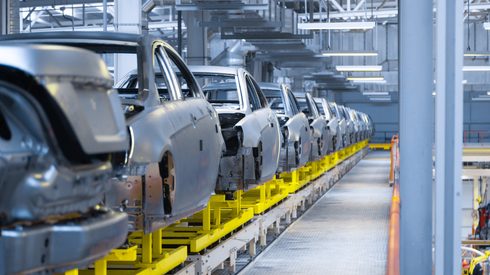Contractors reported “extremely long and unpredictable lead times” for transformers, Kenneth Simonson, chief economist of the Associated General Contractors of America (AGC), told Fastmarkets on Monday April 15.
Contractors waiting for electrical transformers are “quoted a long lead time and then told of a further delay when the delivery date is imminent,” Simonson said.
“I’m not close to electrical equipment manufacturers or their steel suppliers but I’m told that Cleveland-Cliffs, the principal supplier of grain-oriented electrical steel that’s essential for transformers, has been reluctant to expand production, which is producing the long lead times,” he added.
It was not possible to obtain a reply from Cleveland-Cliffs to requests for comment by the time of publication.
Similarly, the Edison Electric Institute (EEI) – an association that represents US electric companies – said in a statement that “electric companies today still are facing unprecedented lead times for transformers.”
The AGC and the EEI – along with groups such as the National Association of Home Builders, the American Public Power Association and Leading Builders of America – wrote to the Senate and House in November 2022 to ask for $1 billion that year to address the problems with transformer supplies.
Material availability was identified as a leading cause in the delays. The letter included recommendations such as “building manufacturing capacity to support long-term demand and investing in domestic production of grain-oriented electrical steel (GOES), a key transformer component.”
Between 2020 and 2022, average lead times to produce transformers across all segments of the electric industry and voltage classes had increased by 443%, the letter said. Orders that previously took two to four months to fill were at the time “taking on average over a year.”
“Construction and electrification projects are now being deferred or canceled” while delays were making it harder to address housing affordability, the organizations added.
Demand for GOES electrical steel is set to expand greatly over the next decades at a faster pace.
A ruling issued by the Department of Energy (DOE) on April 4 on “new energy standards for distribution transformers” would lead to increased use of GOES, seen as key for future energy savings and pollution reduction in power distribution.
But the ruling has yet to be enacted. A DOE official did not respond by the time of publication to a question related to the estimated timing for the enactment.
“Once this rule is enacted, we expect to actually see an increase in demand for our GOES, opening the possibility of future investments and expansion of our plants in Butler, [Pennsylvania], and Zanesville, [Ohio],” Lourenco Goncalves, Cleveland-Cliffs’ chief executive officer, said on April 4 after the ruling announcement.
Both plants hire unionized workers, he added.
Investment in GOES production capacity has been seen as conditioned to legislative changes in the past, for example in January 2023.
At the time, senators Sherrod Brown (Democrat, Ohio) and Bob Casey (Democrat, Pennsylvania) wrote a letter to US commerce secretary Gina Raimondo “to address the improper imports of downstream GOES products by adding them to Section 232 tariffs,” Brown said in a press release on January 13, 2023.
Under Section 232 of the Trade Expansion Act of 1962, former US President Donald Trump in 2018 imposed 25% tariffs on imports from several countries that exported steel products to the US, including China. Imports from Canada and Mexico have enjoyed exceptions.
“Without strong actions by the [US President Joe] Biden administration to address these downstream product trade distortions… domestic investment to expand GOES production will not likely occur,” the joint letter said.
The letter claimed Mexico and Canada were being used by third countries to bring GOES to the US. The Ohio and Pennsylvania plants owned by Cleveland-Cliffs employed thousands of United Auto Workers Union members, it said.
In 2020, at the urging of the senators, the Department of Commerce initiated a Section 232 investigation into imports of GOES derivative products, finding concerns, the letter added. But Commerce had not acted and continued to allow imports, the letter said.
Since the time of the release, construction activity – which drives demand for transformers and electrical steel –has increased.
According to the AGC’s most recently released statistics, total US construction spending rose by 11% in February compared with the same month a year earlier. Manufacturing construction gained the most, with a 32% increase.
Private residential construction expanded by 7%, while office construction expanded by 6%, the AGC added.
US Steel announced in October the start of a new electrical steel line in its Big River plant in Osceola, Arkansas, but it makes the non-grain oriented electrical steel (NGOES) that is used in making electrical motors of electric vehicles and hybrids.
With over 100 years’ experience analyzing and pricing commodities markets, Fastmarkets provides independent, trusted benchmark prices in critical construction materials such as base metals, scrap, steel and wood products. Find out about our construction suite today.






